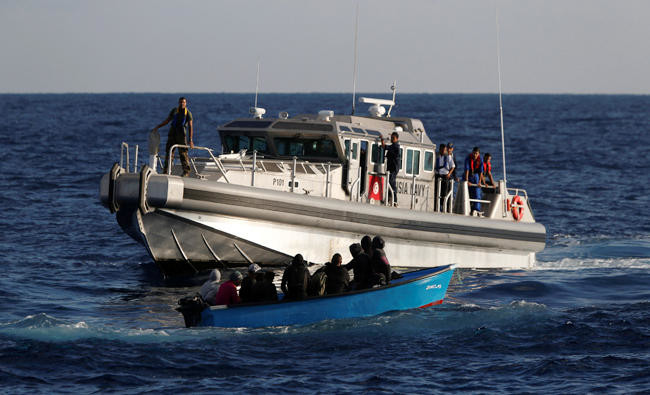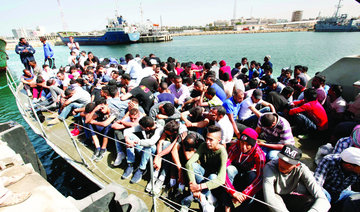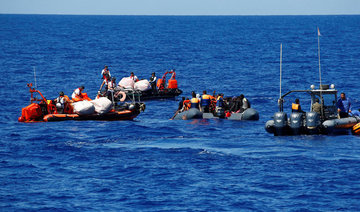TUNIS/THESSALONIKI: The Tunisian navy rescued 98 Tunisians fleeing to Europe when their boat started to sink off Kerkenah on the southeast coast late on Saturday, the national guard said.
Separately, the army said it had arrested 43 illegal migrants rescued from four boats off Zarzis, also on the southeast coast.
Tunisia has been praised for its democratic progress after a 2011 uprising against autocrat Zine El-Abidine Ben Ali but successive governments have failed to create jobs for young people, some of whom head illegally to Europe to seek work.
Tunisia arrested about 550 Tunisian and African migrants trying to sail to Europe in September, against only 170 in August, official data showed on Thursday.
Human traffickers increasingly use Tunisia as a launch pad for migrants heading for Europe as Libya's coast guard, aided by armed groups, has tightened controls.
"The water leaked to a boat carrying 98 migrants, when it was sinking, but the naval guard rescued them off the coast of Kerkenah," Col. Maj. Khelifa Chibani of Tunisia's national guard said.
Migrants’ smugglers held
Greek police said they have arrested eight migrant traffickers who reportedly smuggled 38 migrants through Greece's land border with Turkey.
All the arrests were made Friday, in northern Greece, in four separate incidents.
The largest group of migrants — 10 from Vietnam, two from Iraq and two from Pakistan — was smuggled by two Moldovans and a Romanian. The migrants were stashed in one car while two other traffickers drove another vehicle, checking for police roadblocks, police say.
Ten Syrians and Somalis smuggled in by a Bulgarian driver told police they paid €2,400 ($2,836) each to be taken into central Europe. Another seven Iraqis, five Afghanis and two Pakistanis were also smuggled in by traffickers.
Similar incidents occur almost daily, police say.
Tunisia rescues 140 migrants off its coast
Tunisia rescues 140 migrants off its coast

Gaza rescuers say Israeli strikes kill at least 16

- Eight people were killed in an Israeli strike on the Abu Mahadi family home in Jabalia
- An Israeli strike on the Al-Agha family home killed five people in an area of Khan Yunis in the south
GAZA CITY, Palestinian Territories: Gaza’s civil defense agency said Israeli strikes on Monday killed at least 16 people across the Palestinian territory, which has been under an Israeli aid blockade for more than 50 days.
Israel resumed its military campaign in the Gaza Strip on March 18. A ceasefire agreement that had largely halted the fighting for two months before that collapsed over disagreements between Israel and the Palestinian militant group Hamas, whose 2023 attack triggered the war.
Gaza’s civil defense agency said Monday that eight people were killed in an Israeli strike on the Abu Mahadi family home in Jabalia, in the north of the territory.
“They were sleeping in their homes, feeling safe, when missiles hit... this scene makes the body shiver,” said Abdul Majeed Abu Mahadi, 67, who added that his brother was killed in the attack.
“If a person looked at this scene, they would have seen children, women and elderly men cut into pieces, it makes the heart ache, but what can we do?“
The civil defense agency also reported that an Israeli strike on the Al-Agha family home killed five people in an area of Khan Yunis in the south.
It added that two people were killed in an Israeli strike that hit a tent sheltering displaced people in the Al-Shafii camp, west of Khan Yunis.
One more was killed when an Israeli air strike targeted the Abu Mazen roundabout area west of Gaza City, it said.
There was no immediate comment from the Israeli military.
The health ministry in Hamas-run Gaza said on Monday that at least 2,222 people have been killed since Israel resumed strikes, bringing the overall death toll since the war broke out to 52,314.
The Hamas attack on Israel on October 7, 2023 resulted in the deaths of 1,218 people on the Israeli side, mostly civilians.
Militants also abducted 251 people, 58 of whom are still being held in Gaza, including 34 the Israeli military says are dead.
Israel says its renewed military campaign aims to force Hamas to free the remaining captives.
Interior minister blames ‘negligence’ for Iran port blast that killed 46

TEHRAN: Iran’s minister of interior on Monday blamed “negligence” for a massive explosion that killed 46 people at the country’s largest commercial port, with firefighters still battling a blaze at the facility two days later.
The blast took place on Saturday at the Shahid Rajaee Port in Iran’s south near the strategic Strait of Hormuz, a waterway through which one-fifth of global oil output passes.
“The death toll in the Shahid Rajaee Port fire has reached 46,” the official IRNA news agency reported, quoting Mehrdad Hassanzadeh, the crisis management director for Hormozgan province.
Officials have said more than 1,000 people were injured, with Hassanzadeh noting most had since been released after treatment.
Only “120 wounded are still in hospital,” Interior Minister Eskandar Momeni, who is in the area, told state TV on Monday.
He added that “culprits have been identified and summoned,” and that the blast was caused by “shortcomings, including noncompliance with safety precautions and negligence.”
Iran’s state TV showed images of firefighters still dousing the flames Monday, and said the damage would be assessed after the fire was fully brought under control.
Heavy charcoal-black smoke continued to billow over low flames at part of the site, above which a firefighting helicopter flew, pictures from the Iranian Red Crescent showed.
Iran’s supreme leader Ayatollah Ali Khamenei has ordered a probe into the incident.
It was not immediately clear what caused the explosion but the port’s customs office said it likely resulted from a fire that broke out at the hazardous and chemical materials storage depot.
CCTV images on social media showed it began gradually, with a small fire belching orange-brown smoke among a few containers stacked outside, across from a warehouse.
A small forklift truck drives past the area and men can be seen walking nearby.
About one minute after the small fire and smoke become visible, a fireball erupts as vehicles pass nearby, with men running for their lives.
President Masoud Pezeshkian visited hospitals treating the wounded on Sunday in the nearby city of Bandar Abbas.
Since the explosion, authorities have ordered all schools and offices in the area closed, and have urged residents to avoid going outside “until further notice” and to use protective masks.
The New York Times quoted a person with ties to Iran’s Islamic Revolutionary Guard Corps, speaking on condition of anonymity to discuss security matters, as saying that what exploded was sodium perchlorate — a major ingredient in solid fuel for missiles.
Defense ministry spokesman Reza Talaei-Nik later told state TV that “there has been no imported or exported cargo for military fuel or military use in the area.”
Iran’s ally Russia has dispatched specialists to help battle the blazes.
Authorities have declared Monday a national day of mourning, while three days of mourning began Sunday in Hormozgan province, where the port is located.
The blast occurred as Iranian and US delegations were meeting in Oman for high-level talks on Tehran’s nuclear program, with both sides reporting progress.
While Iranian authorities so far appear to be treating the blast as an accident, it also comes against the backdrop of years of shadow war with regional foe Israel.
According to The Washington Post, Israel launched a cyberattack targeting the Shahid Rajaee Port in 2020.
Israeli authorities order Palestinians to stop building homes in Al-Jib town

- Residents were ordered to halt construction on three homes and caravans for livestock
- The stop-work order is a decree that often triggers a demolition order
LONDON: Israeli authorities issued stop-work orders for several Palestinian structures being built in Al-Jib town, north of occupied East Jerusalem.
On Monday, authorities stormed Al-Jib and notified residents to halt construction on three homes and caravans for raising livestock, according to the Wafa news agency. The stop-work order is a decree that often triggers a demolition order.
The majority of village territory, located 9 km north of Jerusalem, falls within Area C where the Palestinian Authority is in charge of educational and health services, while Israel remains responsible for security and construction.
Israel restricts Palestinians from expanding in Area C, and inside Jerusalem, it rarely grants building permits to residents of the city. Al-Jib is surrounded by several Israeli settlements, the biggest of which is Giv’at Ze’ev.
The Palestinain Authority-affiliated Wall and Settlement Resistance Commission reported in March that Israeli authorities carried out 58 demolition operations in the occupied West Bank, affecting 87 structures. These included 39 inhabited homes, six uninhabited houses, and 26 agricultural properties in the cities of Nablus, Tulkarm, Jerusalem, and Salfit.
Houthis say alleged US airstrike that hit Yemen prison holding African migrants kills 68

DUBAI: The Houthis on Monday alleged a US airstrike hit a prison holding African migrants, killing at least 68 people and wounding 47 others. The US military did not acknowledge carrying out the strike.
The strike was in Yemen’s Saada governorate, a stronghold for the Houthis.
It will likely renew questions from activists about the American campaign, known as “Operation Rough Rider,” which has been targeting the militia as the Trump administration negotiates with their main benefactor, Iran, over Tehran’s rapidly advancing nuclear program.
The US military’s Central Command, in a statement early Monday before news of the alleged strike broke, sought to defend its policy of offering no specific details of its extensive airstrike campaign. The strikes have drawn controversy in America over Defense Secretary Pete Hegseth’s use of the unclassified Signal messaging app to post sensitive details about the attacks.
“To preserve operational security, we have intentionally limited disclosing details of our ongoing or future operations,” Central Command said. “We are very deliberate in our operational approach, but will not reveal specifics about what we’ve done or what we will do.”
It did not immediately respond to questions from The Associated Press about the alleged strike in Saada.
Graphic footage shows aftermath of explosion
Graphic footage aired by the Houthis’ Al-Masirah satellite news channel showed what appeared to be dead bodies and others wounded at the site. The Houthi-run Interior Ministry said some 115 migrants had been detained at the site.
The militia’s Civil Defense organization said at least 68 people had been killed and 47 others wounded in the attack.
Footage from the site analyzed by the AP suggested some kind of explosion took place there, with its cement walls seemingly peppered by debris fragments and the wounds suffered by those there.
A voice, soft in the footage, can be heard repeating the start of a prayer in Arabic: “In the name of God.” An occasional gunshot rang out as medics sought to help those wounded.
The International Organization for Migration, a United Nations agency, said it was “deeply saddened” by the deaths at the prison.
“It is imperative that all efforts are made to avoid harm to civilians and to protect those most vulnerable in these challenging circumstances,” it said.
US military says over 800 strikes conducted in campaign so far
Meanwhile, US airstrikes overnight targeting Yemen’s capital killed at least eight people, the Houthis said. The American military acknowledged carrying out over 800 individual strikes in their monthlong campaign.
The overnight statement from Central Command also said “Operation Rough Rider” had “killed hundreds of Houthi fighters and numerous Houthi leaders,” including those associated with its missile and drone program. It did not identify any of those officials.
“We will continue to ratchet up the pressure until the objective is met, which remains the restoration of freedom of navigation and American deterrence in the region,” it added.
The US is targeting the Houthis because of the group’s attacks on shipping in the Red Sea, a crucial global trade route, and on Israel. The Houthis are also the last militant group in Iran’s self-described “Axis of Resistance” that is capable of regularly attacking Israel.
US discusses deadly port strike
The US is conducting strikes on Yemen from its two aircraft carriers in the region — the USS Harry S. Truman in the Red Sea and the USS Carl Vinson in the Arabian Sea.
On April 18, an American strike on the Ras Isa fuel port killed at least 74 people and wounded 171 others in the deadliest-known attack of the American campaign. Central Command on Monday offered an explanation for why it hit the port.
“US strikes destroyed the ability of Ras Isa Port to accept fuel, which will begin to impact Houthi ability to not only conduct operations, but also to generate millions of dollars in revenue for their terror activities,” it said.
Meanwhile, the Houthis have increasingly sought to control the flow of information from the territory they hold to the outside world. It issued a notice Sunday that all those holding Starlink satellite Internet receivers should “quickly hand over” the devices to authorities.
“A field campaign will be implemented in coordination with the security authorities to arrest anyone who sells, trades, uses, operates, installs or possesses these prohibited terminals,” the Houthis warned.
Starlink terminals have been crucial for Ukraine in fighting Russia’s full-scale invasion and receivers also have been smuggled into Iran amid unrest there.
Sisi meets Burhan in Cairo to discuss restoring stability in Sudan

- 2 leaders also planned to consult on strengthening bilateral ties
DUBAI: Egyptian President Abdel Fattah El-Sisi and Sudan’s Transitional Sovereign Council President Gen. Abdel Fattah Al-Burhan met in Cairo on Monday to discuss ways to restore stability and promote development in Sudan.
The two leaders also planned to consult on strengthening bilateral ties and addressing various regional issues, Ahram Online reported.
Al-Burhan’s visit comes amid ongoing conflict in Sudan, where fighting between the Sudanese army and the Rapid Support Forces has devastated the country.
Al-Burhan declared Khartoum “free” of RSF control in March after a major military push.
The war, which erupted in April 2023 over disputes regarding the RSF’s integration into the military, has left tens of thousands dead, with both sides accused of committing atrocities.
Sudan remains deeply divided, with the army controlling the north and east, while the RSF holds much of Darfur and parts of the south.



















